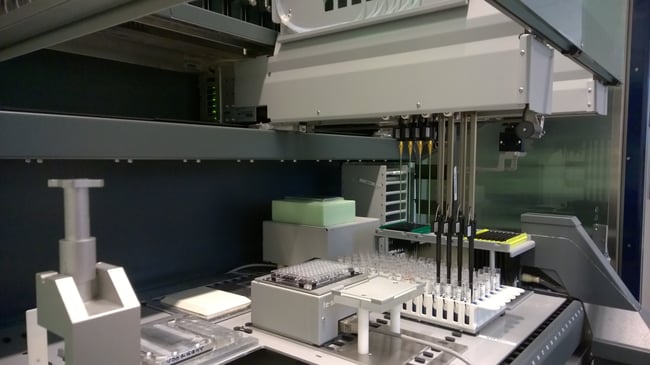Case Study: Vitamin testing
A helping hand for vitamin testing
A Freedom EVO® workstation is proving key to the provision of high quality vitamin testing services at the Medical Laboratories of the Reinier de Graaf Hospital. This versatile solution has enabled full automation of the majority of sample preparation workflows for LC analysis of vitamins, generating major time and cost savings, and meeting the laboratory’s increasing throughput demands.
The Medical Laboratories of the Reinier de Graaf Hospital, based in the picturesque city of Delft, are major suppliers of medical diagnostic services in the Netherlands. As well as providing routine services for the hospital – including clinical chemistry, hematology, blood banking, immunology, pharmacy and microbiology – the laboratory is a renowned Dutch reference laboratory that offers sophisticated diagnostic services to other medical laboratories, universities, the food industry and organizations such as the Netherlands Forensic Institute.

The flexible nature of the Freedom EVO enables the laboratory to perform a wide range of individual sample processing steps.
The Department of Chromatography plays a key role in delivering these advanced testing services, as clinical chemist Dr Frans van der Horst explained: “We have an obligation to our patients, colleagues and external clients to provide fast, high quality services at the lowest cost. Liquid and gas chromatography (HPLC/GC) offer rapid, cost-effective testing for a wide range of analytes, but sample clean-up prior to analysis has traditionally been performed manually, making sample preparation labor intensive, time consuming and prone to errors. As an ISO 15189 compliant laboratory, quality control and process security are very important to us, and so we looked for ways to eliminate these tedious manual processes. Automation was the obvious solution, as this would not only help to streamline our workflow, but also to improve traceability and deal with the double digit growth in sample numbers that we are seeing every year.”
The Freedom EVO workstation is clearly a very versatile system.
Yolanda van Leusden, Manager of the Department of Chromatography, took up the story: “One of the main reasons for looking into automation was to cut the costs of testing. We had already optimized our manual sample pretreatment procedures as far as was practical, and so further improvements to our existing workflow were not feasible. The repetitive nature of sample preparation was ideally suited to automation, and this would free up staff to perform other activities, reducing the cost per test. Another benefit of automation was the potential to scale down many protocols into a 96-well microplate format, offering significant savings on reagent costs.”
A flexible platform for multiple protocols
Frans continued: “We didn’t have any previous experience with automated liquid handling systems, and so looked at the various instruments on the market. Because the pre-analytical procedures for each assay vary significantly, we needed a very flexible platform that would be able to accommodate these individual sample preparation protocols. The Freedom EVO workstation is clearly a very versatile system, and its open architecture also provided the opportunity to integrate several devices already being used with our manual techniques onto the platform."
"Our Freedom EVO 150 instrument is equipped with an eight-channel Liquid Handling Arm using a combination of fixed and disposable tips, a Pick and Place Arm, a Robotic Manipulator Arm, a Te-Shake™ module and a Hettich Centrifuge, as well as a custom heating module and microplate transfer racks. This flexible set-up enables us to perform the wide range of individual sample processing steps we require. The first protocol we chose to automate was our vitamin B1/B6 workflow, as this is one of our most frequently requested assays, and is very complex to perform manually. This gave us the opportunity to assess the Freedom EVO platform’s capabilities using a method we were very familiar with, and would obviously have a bigger impact on our throughput once it was brought into routine use.”
Louwra Koolmees, a member of the team responsible for developing the automated protocols, commented: “The system’s user-friendly Freedom EVOware® software meant that we were able to transfer our manual procedures onto the platform quite easily, with very little support from Tecan required.” Her colleague Marion Pleunes added: “Once we had set up the basic scripts, we put a lot of effort into validating every step – paying particular attention to the reproducibility of pipetting for the various reagents and biological fluids – to ensure they met our high quality standards. The results clearly demonstrated that the automated protocols were better than our traditional manual procedures.”
Following the successful implementation of the fully automated vitamin B1/B6 protocol, the laboratory has now transferred preparation of the majority of its vitamin assays to the Freedom EVO. Frans concluded: “The instrument is set up to perform protein precipitation, centrifugation, incubation and solid phase extraction – as well as aliquotting and pipetting, of course – giving us access to a wide range of techniques to meet the needs of individual assays. As far as we can see, there are no technical limitations to automating all of our vitamin sample preparation protocols. Our next goal is to develop liquid-liquid extraction protocols, a technique which, although very cheap and robust, is technically quite complex to automate. If we can accomplish that, then we will have a Freedom EVO platform covering the full sample preparation range which, to me, appears to be a big paradigm shift for medical laboratories.”
To learn more about Tecan’s clinical diagnostics solutions, visit www.tecan.com/clinicalsolutions
To find out more on the Reinier de Graaf Hospital, go to www.reinierdegraaf.nl
This article was first published in Tecan Journal, Issue 1, 2015
More diagnostics cases:
Bremen Labs >
Munich Leukemia Lab >










